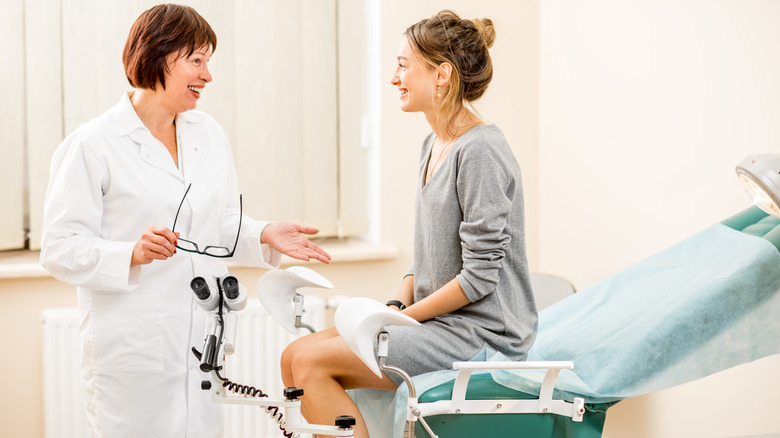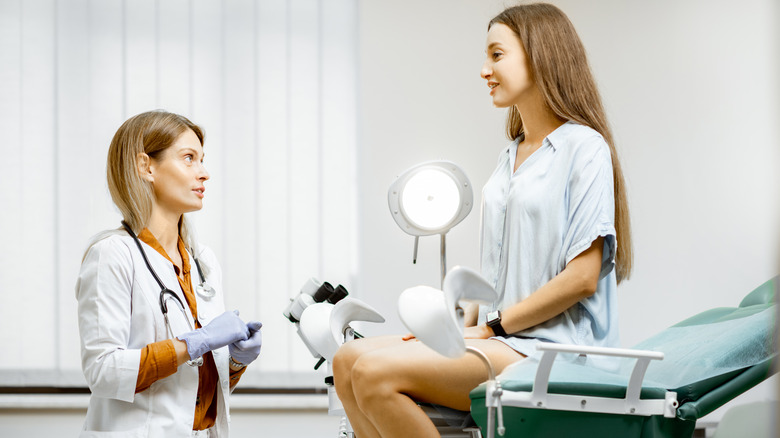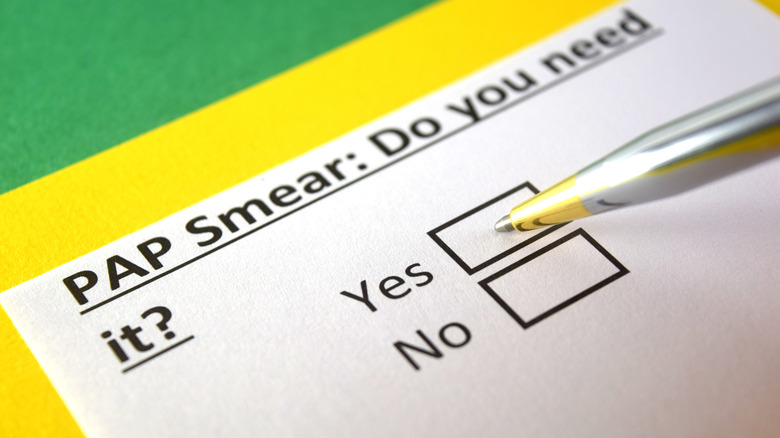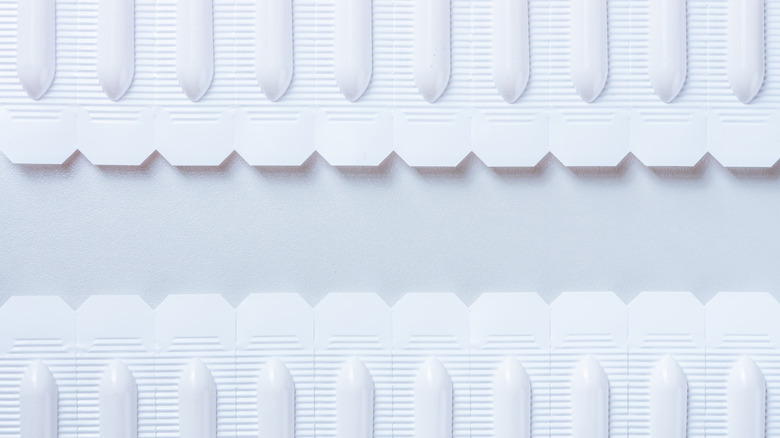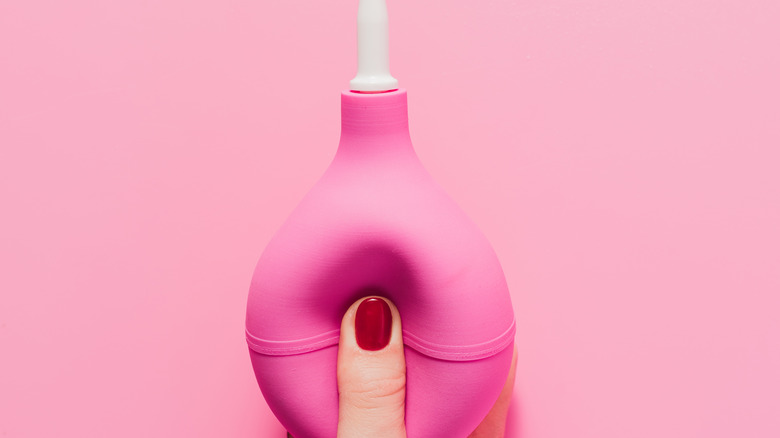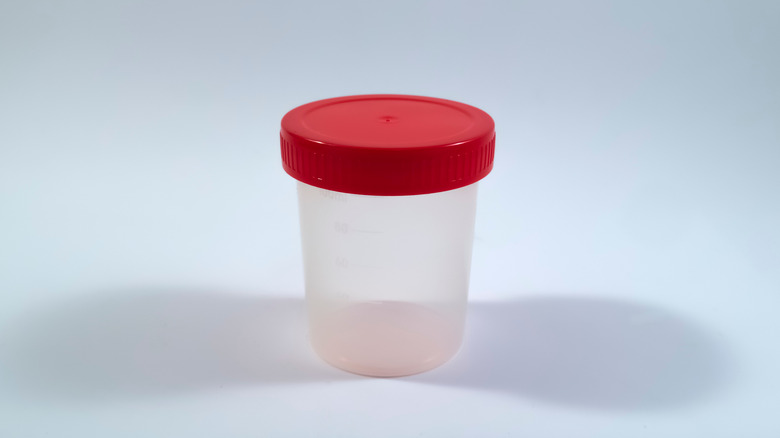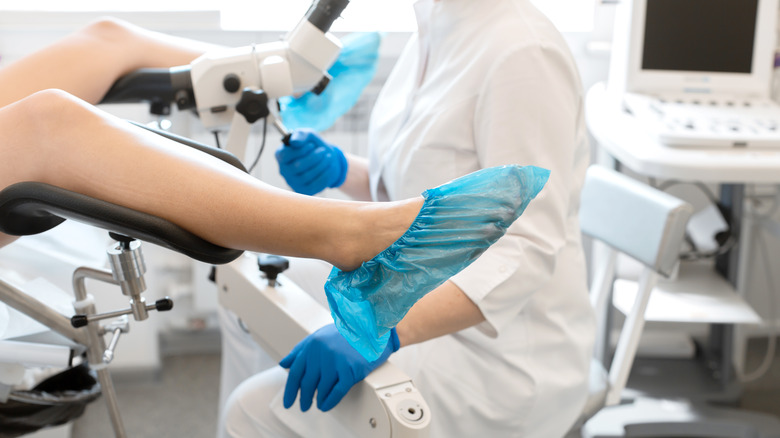Things You Should Never Do Before Going To The Gynecologist
Going to the gynecologist every year is necessary for good reproductive and general health. Typically, your gynecologist will perform a Pap smear (aka Pap test) every few years, according to the American College of Obstetricians and Gynecologists (ACOG). And as a patient, you want to do the best you can to ensure that the Pap test's results are clear and correct — because you don't want to get false bad news or have to repeat the Pap. It's not exactly something anyone is eager to do over again.
Although a spokesperson for the American College of Obstetricians and Gynecologists told Health Digest that ACOG doesn't "recommend against any specific activity prior to your OB-GYN appointment," some gynecologists suggest practices and products to avoid, based on the thought they may interfere with exam or test results. To ensure that your Pap results are not accidentally skewed, there are some things you may want to avoid in the days and hours leading up to your appointment. Let's take a look at what to expect at your next exam, and how to prepare for it.
How to prep for a typical annual exam
Keep in mind that even though a pelvic exam and cervical cancer screening may not be required each year, an annual exam is still recommended as it's important for a number of reasons. You'll have the opportunity to ask your OB-GYN about sex, birth control, or any medical concerns you have, as well as discuss testing for STIs. It's also a good time to consider getting any vaccines you may need. Just as important for your overall health, you'll also have your weight and blood pressure checked as well as your urine tested, according to the American College of Obstetricians and Gynecologists.
As far as prep for well visits go, well, you really just need to show up. You can also opt to bring a list of questions. "When many women visit with an OB/GYN, they get a bit anxious — so writing down notes is good," Dr. Jane Minkin, clinical Professor of OB/GYN at Yale University, told Bustle. Dr. Marie Werner, a fertility specialist, agrees. "If you are worried about a symptom, write it down and ask your doctor," she advised.
Is there a pelvic exam in your future?
In the past, pelvic exams and Pap tests were required annually for every woman. It was believed that even if a woman had no symptoms, a pelvic exam was necessary to screen for various conditions. More recent studies have evaluated whether pelvic exams are beneficial for detecting ovarian cancer, infections like bacterial vaginosis, and sexually transmitted infections (STIs) such as genital herpes. The data are not strong enough to support a recommendation for the routine use of pelvic exams. As a result, the current guidelines from the American College of Obstetricians and Gynecologists (ACOG) have been (thankfully) relaxed from that strict once-a-year schedule.
A pelvic exam isn't automatically performed at the annual appointment, except in certain circumstances, such as if the patient is pregnant, has a history of specific medical conditions, has symptoms, or is getting an IUD. A pelvic exam is not needed to screen for STIs or to get birth control other than an IUD. ACOG recommends that it be a "shared decision" between the patient and her doctor whether or not one is performed. Be sure to let your health care provider know if you prefer to have a pelvic exam.
What about a Pap test?
The Pap test, or Pap smear, is also no longer required annually. Because cervical cancer normally takes years — sometimes over a decade – to develop, frequent Pap tests aren't necessary, Dr. David Mutch, a gynecologic oncologist, explained on the ACOG website.
There's also a second test available for cervical cancer: the human papillomavirus (HPV) screening. HPV causes genital warts and increases the risk of cervical cancer. HPV testing is conducted just like a Pap smear, but unlike the Pap (which looks for abnormal cells that may herald the development of cancer), the HPV test screens for strains of HPV, particularly types 16 and 18, that are most likely to lead to cancer (via Healthline).
Whether you need to have a Pap test, HPV test, or both depends on your age and medical history. In patients under 21 years of age, neither the Pap smear nor HPV test is routinely performed because the chance of developing cervical cancer is extremely low. After 65, when the risk of cancer is also low, screenings are not needed anymore if you've never had cervical dysplasia or cancer and have had two or three negative tests in a row. Between 21 and 65, even if you're not sexually active, Pap tests alone, HPV tests alone, or both are recommended every three or five years, depending on your medical history. However, if you're in a certain group, such as those with a weakened immune system, you may need to have more frequent screenings, according to ACOG.
Avoid using suppository contraceptives before your appointment
From foams to jellies and films to tablets, there's a large variety of contraceptive suppositories available on the market. They all have one thing in common however: spermicide. Spermicide prevents pregnancy by blocking sperm from entering the cervix and by killing the sperm itself (per Verywell Health). Spermicide's active ingredient is nonoxynol-9.
Using contraceptive suppositories before a pelvic exam and Pap test can affect the results. These products may contain ingredients that cause redness and itching of the vulva, according to Flo. Your OB-GYN may mistake such irritation for symptoms of an infection, STI, or other gynecological problem. It's always best to preserve the natural flora (bacteria) in your vagina by avoiding these contraceptives for one to three days prior to your appointment so your provider can clearly assess your genital health. These products can also skew the accuracy of Pap test results by altering the pH of cervical cells or by masking abnormal cells, Johns Hopkins Medicine explained.
Don't douche before your appointment (or ever)
The American College of Obstetricians and Gynecologists has a pretty firm stance on douching: Don't do it. Not only should you avoid it before an appointment with your gynecologist, but you should always avoid it (per MedicineNet). Still, nearly 20% of American women between 15 and 44 douche, according to the Office on Women's Health, U.S. Department of Health & Human Services. The practice may be popular because such products are advertised as necessary to prevent vaginal odor and as the best way to "clean" the vagina. In reality, douching has been linked to many reproductive health problems, from something as mild as vaginal irritation to an overgrowth of harmful bacteria, which can lead to a yeast infection or bacterial vaginosis, to more serious problems, like pelvic inflammatory disease or difficulties during pregnancy.
Douching before a Pap test is especially problematic. The vagina naturally maintains a balance of good and harmful bacteria, which helps keep the environment acidic. An acidic environment is essential for protecting the vagina from irritation and infections. With douching, that balance of bacteria is upset, therefore affecting the vagina's acidity. And this change in pH can lead to distorted test results (via Flo).
Additionally, douching can flush away telltale surface cells that may indicate a problem, according to Johns Hopkins Medicine, as well as temporarily cover up odor or other symptoms that your doctor needs to note to make an accurate assessment. So resist the urge to douche before your appointment and simply wash with warm water and mild soap (per Flo).
Avoid having sex
It's commonly recommended to avoid intercourse before an OB-GYN appointment. Generally, "it [is] advised that nothing should be in the vagina two to three days before your appointment," Dr. Kecia Gaither, an OB-GYN and director of perinatal services at NYC Health+Hospitals/Lincoln, told Romper.
There are two reasons why. First, the discharge from intercourse may be incorrectly seen as a symptom of an infection or STI during a pelvic exam (via Glamour). Secondly, sex in the days before a Pap might interfere with its results. The alkalinity of sperm can affect the acidity of the vagina, disrupting Pap test results (per Flo). In addition, semen might obscure atypical cervical cells on the Pap. "Although most Pap tests are now done with a liquid medium that 'washes' cells and makes them easier to see, it is still possible for sperm cells to be present that make the cervical cells harder to see," Jonathan Schaffir, an OB-GYN at the Ohio State University Wexner Medical Center, told Glamour.
Or maybe don't avoid having sex
There is actually one scenario when it's recommended that you indulge in intercourse before your appointment, and that's if you've been experiencing bleeding after sex. Gynecologist Lauren Streicher told Dr. Mehmet Oz on Sharecare that if a patient bleeds after intercourse, it's helpful for her diagnostically to see what the source of bleeding is. Is it coming from the uterus, cervix, or vagina?
But if you don't experience bleeding or any other problems during sex, it's best to refrain from intercourse for a few days — not just the night — prior to your appointment (via Romper). Should you forget and "accidentally" indulge, you may, unfortunately, need to consider rescheduling your appointment under certain circumstances — for instance if the reason for your visit is unusual discharge or a pungent odor. Semen can make it difficult for your doctor to accurately assess the situation.
Other than that, there's probably no need to reschedule after having recent sex. After all, it may have taken you months to get an appointment. Or you might desperately need contraceptives. "I would not cancel an appointment just because of recent sexual activity," Dr. Schaffir told Glamour. In that case, just fess up and let your doctor know so they can interpret test results accordingly. By being honest, you'll also save yourself time and prevent stress if results come back abnormal and you're asked to repeat the test.
Putting off an appointment when you first develop symptoms is not a good idea
Troubling symptoms don't always conveniently spring up right before you're going to see the OB-GYN. In fact, they rarely have the manners to do so. They seem more likely to arise when you're nowhere near your appointment. Depending on your symptoms, you may be able to wait to address the problem or the problem may be something that requires prompt medical attention. But it's often hard to distinguish between the two. The last thing you want to happen is for something that could've been treated early on to develop into a serious problem.
Many doctors prefer immediate action when symptoms appear rather than a wait-and-see approach. "Remember, knowledge is power," Dr. Angela Jones, an OB-GYN and Astroglide's sexual health advisor, told Romper. "A proper exam and diagnosis leads to treatment." It's much more prudent to make the appointment ASAP, so you can get the problem taken care of or get relief from worry. Don't put it off until your next checkup, assuming it's nothing.
There are some problems that definitely need immediate attention. They include heavy or prolonged spotting between periods, debilitating cramps or cramps that have worsened, deep or sharp pain or burning during sex, ongoing vaginal dryness, change in discharge, foul vaginal odor, missing periods, vaginal itching or swelling after intercourse, difficulty getting excited or having an orgasm, and severe PMS with wild mood swings and/or incapacitating physical symptoms, according to Self. If any of these happen, contact your doctor pronto.
Avoid diagnosing or treating yourself
It's tempting to Google a symptom to determine what's wrong. But what typically happens is instead of providing definitive answers, a search turns up a long list of possibilities — each one worse than the next. If you've experienced similar symptoms before and had a diagnosed yeast infection or urinary tract infection (UTI), you might initiate treatment on your own. With over-the-counter anti-fungal products available, treating yeast infections seems easy. And at-home remedies for UTIs abound (via Healthline). But self-treating either could be costly.
Some conditions present with symptoms similar to those of a yeast infection, including a bacterial infection, an allergy, or an STI (per Prevention). "Vaginal cultures can and should confirm what ... is causing your symptoms so the best treatment can be prescribed," Sheryl Ross, an OB-GYN at Providence Saint John's Health Center in Santa Monica, California, told Prevention.
Without getting a diagnosis the actual condition may stay unknown and untreated, leading to worsening symptoms. Additionally, self-treatment can hamper a professional diagnosis. "Don't come in for an appointment in the middle of your treatment," Nancy Lebowitz, clinical instructor at NY Presbyterian/Weill-Cornell in New York City, told The Healthy. "We can't do anything if you've already applied the medicine since it gets too messy for us to do an accurate exam." As for UTIs, antibiotics are the standard of care. While it's generally fine to use home remedies to try to prevent UTIs, they shouldn't serve as treatment.
Avoid peeing immediately before your exam
While concentrating on your upcoming pelvic exam, you've probably forgotten all about the lowly but ubiquitous urinalysis. You may even make the mistake of peeing before you leave for the doctor or, worse yet, at the doctor's office just before you're called into the examining room. But this is something to avoid. Peeing into a cup is important for your exam, as it allows your doctor to noninvasively peer into your body and get a picture of your overall health.
Your doctor can tell a few things by just looking at your sample and checking its odor. Color says a lot. For instance, if it's dark, that could mean you're dehydrated or you might have kidney issues. If your urine is bright pink, red, or reddish-brown as well as cloudy, it could point to a health problem like a UTI. Bad-smelling pee may indicate a bacterial infection, while fruity-smelling pee could reveal you've been on a strict diet (via Walnut Hills Obstetrics & Gynecology Associates in Dallas).
At the lab, urine is tested for various deficiencies, excesses, and appearances of things that shouldn't be there. For example, red or white blood cells can mean an infection, sugar can indicate diabetes, and parasites are, well, a problem. There's a lot more that urinalysis tells your doc, so hold your pee until you're presented with a cup.
Trying to make yourself smell good down there is ill-advised
Your goal may be noble: trying not to offend your gynecologist with a funky odor emanating from your private parts. And so before your appointment, you sit in a bubble bath, lather up using a scented wash, spritz on a deodorant spray, and sprinkle on a flowery powder. This is not only unnecessary, it's actually frowned upon.
Just like douches, scented feminine hygiene products can interfere with the results of a Pap test by altering the normal pH of the vagina. Not only that, but they can mask things your doctor must be able to see for a thorough examination. Your provider needs to observe the "nature, color, smell, and amount of vaginal discharge," according to Flo, as "changes in these parameters can be indicative of a health issue."
Feminine hygiene products can change these parameters by themselves or obscure important signs of a problem. So it's recommended that you skip the fragrance-based niceties and stay as natural as possible. All that's really needed to freshen up and feel confident (well, as much as you can in stirrups) is to shower or simply wash the vulva with warm water and mild soap.

